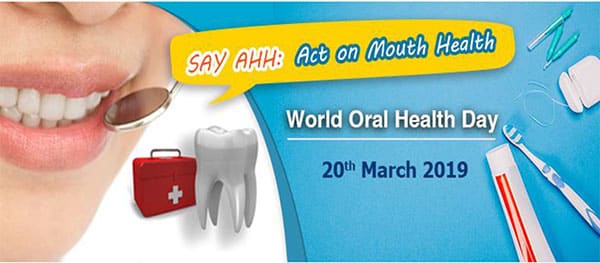Oral Health Awareness
World Oral Health Day is observed every year on 20th March. It focuses on highlighting the benefits of good oral health, spreads awareness about oral diseases and promotes maintenance of oral hygiene.
The theme of the 2019 World Oral Health Day is ‘Say Ahh: Act on Mouth Health’. With this campaign, people are suggested to take concrete actions to prevent oral disease and safeguard their overall health. This theme does not only focus on individuals but also on oral health professionals as they are the stakeholders in educating and protecting patients from oral diseases. The policymakers also aim to address oral diseases’ burden and integrate oral health into policies that address other diseases.
As we all know, our body’s engine requires fuel of calories which we get from food and we eat food through the mouth. If our mouth is not fit, no matter how much healthy we eat. It will not remain useful for us.
Oral health is as important as general health. It helps you maintain a healthy mouth, teeth and gums. It also helps to improve your appearance. Poor oral health can not only lead to oral diseases but also major health problems like heart disease, diabetes mellitus, stroke, respiratory problems and premature births in pregnant women.
Oral health: A window to your overall health
Your oral health is more important than you might realize. Learn how the health of your mouth, teeth and gums can affect your general health.
Did you know that your oral health offers clues about your overall health — or that problems in your mouth can affect the rest of your body? Protect yourself by learning more about the connection between your oral health and overall health.
What’s the connection between oral health and overall health?
Normally the body’s natural defences and good oral health care, such as daily brushing and flossing, keep bacteria under control. However, without proper oral hygiene, bacteria can reach levels that might lead to oral infections, such as tooth decay and gum disease.
Also, certain medications — such as decongestants, antihistamines, painkillers, diuretics and antidepressants — can reduce saliva flow. Saliva washes away food and neutralizes acids produced by bacteria in the mouth, helping to protect you from microbes that multiply and lead to disease.
Studies suggest that oral bacteria and the inflammation associated with a severe form of gum disease (periodontitis) might play a role in some diseases. Certain diseases, such as diabetes and HIV/AIDS, can lower the body’s resistance to infection, making oral health problems more severe.
What conditions can be linked to oral health?
How can I protect my oral health?
| S.NO | Venue |
|---|---|
| 1 | Madura College,Madurai. |
| 2 | Vickram Polytechnic College,Madurai. | 3 | Annamalaiyar Mat.Hr.Sec.School,Madurai. | 4 | Madras Cement Factory, Virudhunagar. | 5 | Nala Dental Hospital, Madurai for TNSTC Members. | 6 | Bhima Jewellery, Madurai. | 7 | RL Institute of Nautical Sciences, Madurai. | 8 | State bank of India, Regional Office, Madurai. | 9 | Govt.Blind School,K.K.Nagar,Madurai. | 10 | MMHRC Conference Hall, Madurai. | 11 | Mahatma School, Madurai. |






